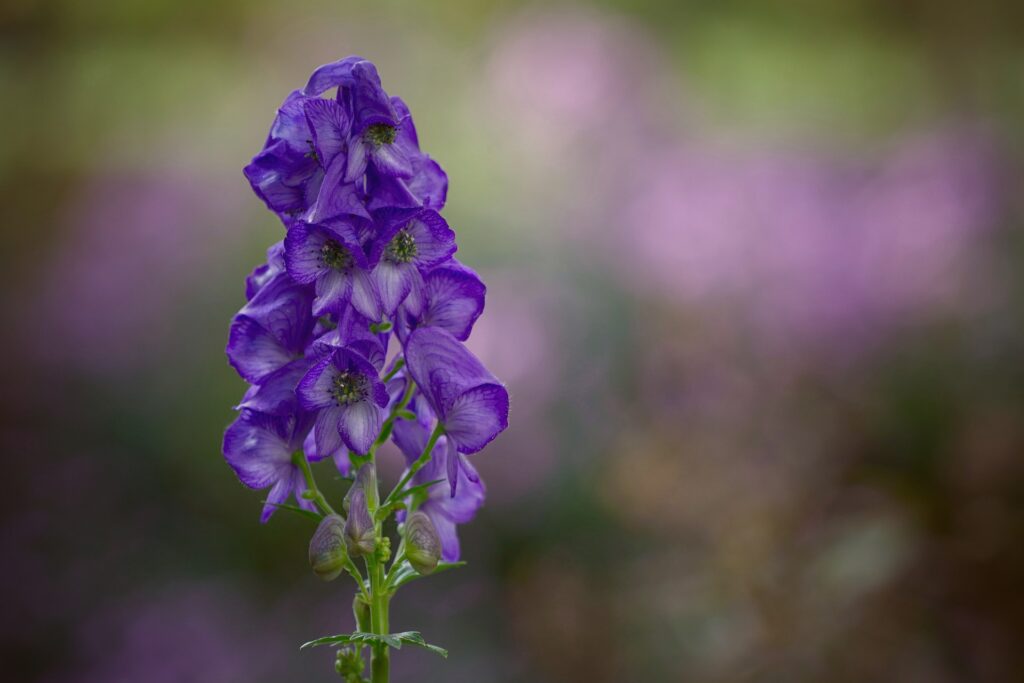Navigating the Storm Within
Anxiety is a normal part of life, helping us stay alert in challenging situations. But when anxiety takes on a life of its own, interfering with daily activities and well-being, it can be classified as an anxiety disorder. Let’s delve into the world of anxiety disorders, exploring their main features and shedding light on what you or your loved ones might be experiencing.

Aconitum
Anxiety with Panic
1. The Overwhelm of Panic Disorder
Picture a sudden rush of fear, heart pounding, and a sense of impending doom. That’s a panic attack, a hallmark of panic disorder. People with this disorder may encounter recurrent, unexpected panic attacks, often accompanied by a fear of having more attacks or even a change in behaviour due to these episodes.
2. Agoraphobia: Fear of Escape
Imagine being terrified of places where escape might be difficult or help might not be available. This is agoraphobia. People with agoraphobia might avoid crowded spaces, public transport, or even leaving their homes, leading to a constrained life.
3. Specific Phobia: Facing Fears Head-On
Do spiders, heights, or flying evoke intense, irrational fear? That’s a specific phobia. Individuals with this disorder experience overwhelming anxiety in response to particular objects or situations, often going to great lengths to avoid them.
4. Social Anxiety: Battling the Fear of Judgment
Think about feeling extremely anxious in social situations, fearing judgment or humiliation. Social anxiety disorder encompasses this apprehension, leading people to avoid gatherings or even day-to-day interactions.
5. Constant Worry with Generalized Anxiety Disorder (GAD)
Imagine feeling worried about numerous aspects of life, from work to relationships, and struggling to control these anxious thoughts. GAD is like a constant cloud of worry, accompanied by physical symptoms like restlessness, fatigue, and muscle tension.
6. OCD: Obsessions and Compulsions
Ever experienced intrusive, unwanted thoughts that lead you to perform certain actions repeatedly to alleviate anxiety? That’s obsessive-compulsive disorder (OCD). Whether it’s washing hands excessively or checking things repeatedly, OCD can be challenging to manage.
7. PTSD: Overcoming Trauma
Imagine reliving traumatic events through nightmares or flashbacks, constantly on edge and emotionally distant. This is post-traumatic stress disorder (PTSD). Individuals who have experienced trauma may struggle with these symptoms, impacting their daily lives.
8. Seeking Help and Hope
If you or someone you know experiences intense anxiety that affects daily life, seeking help is crucial. A healthcare professional can provide an accurate diagnosis and guide you toward effective treatments. Therapy, medication, or a combination of both can often make a significant difference.
Remember, You’re Not Alone

Anxiety disorders are more common than you might think. Millions of people around the world face these challenges, but many find relief and regain control of their lives with proper support and treatment. So, don’t hesitate to reach out for help—there’s a path to managing anxiety and rediscovering a sense of calm and well-being.
Homeopathic medicine has centred its understanding of treatment on psychological characteristics and emotional states we are faced with throughout life. It is through this understanding that we apply medicines that help restore balance within the body and facilitate the healing response.
Here are some of the Homeopathic medicine we use for anxiety and their more commonly associated characteristics:
Aconitum Napellus: For sudden and intense panic attacks, restlessness, and fear of death.
Argentum Nitricum: For anticipatory anxiety and nervousness, especially before important events. As a more generalised anxiety with impulsive and rushed behaviour.
Arsenicum Album: For individuals with perfectionistic tendencies, restlessness, and fear of losing control, of death, of being left alone.
Gelsemium Sempervirens: For anxiety associated with trembling, weakness, and avoiding situations due to fear, for example before an exam.
Ignatia Amara: For anxiety related to grief, loss, and emotional sensitivities, feeling overwhelmed and consumed by emotion.
Lycopodium Clavatum: For performance anxiety, low self-esteem, and fear of public speaking, feelings of inferiority and compound into anxiety.
Natrum Muriaticum: For anxiety related to grief, past emotional hurts, and difficulty expressing emotions, desire to be alone and generally avoiding company or connection.
Pulsatilla Pratensis: For separation anxiety, clinginess, and shifting moods. Great need to be supported and connected.
Bach Flower Remedy: There are a number of Bach flower remedies that are of help in anxiety like Mimulus, Aspen, Rock Rose, Cherry Plum and Red Chestnut. Rescue remedy is the go to for anxeity support across the various types of anxiety.
Remember that the concept of individualized remedies in homeopathy means that different people with the same diagnosis might be given different remedies based on their unique symptoms, trigger and constitutions. Selecting the correct strength and dosage is also very important in considering suitable treatment.
It’s always recommended to consult a qualified healthcare professional, such as a licensed homeopath before considering any kind of treatment for mental health concerns.
If you feel this is something we can assist you with, please free to schedule an appointment here:
APPOINTMENT BOOKING FORM

